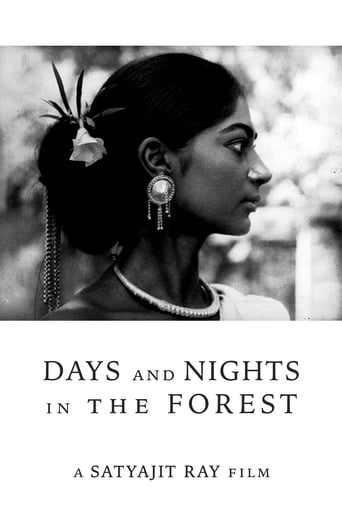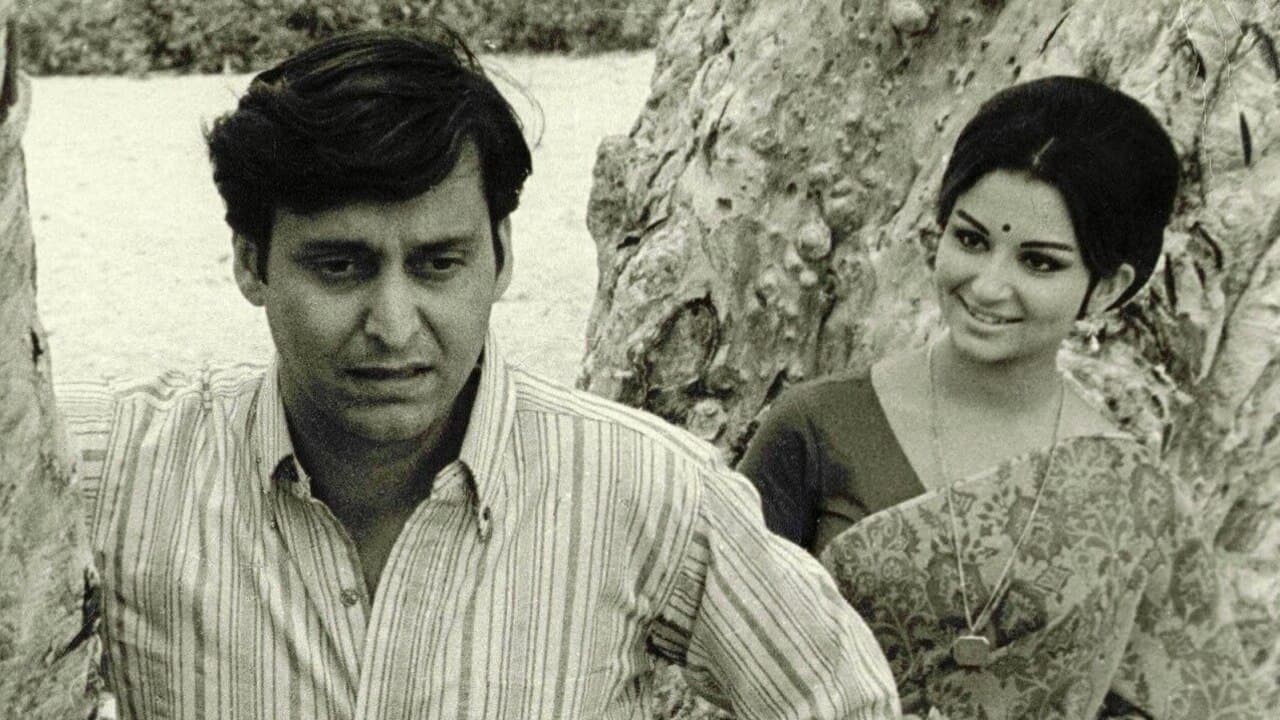Purnendu Dey (purnenduvianworld)
Adapted form Sunil Ganguly's story, the film zooms in on the vagaries and vicissitudes of the then bourgeoisie and their disillusionment with their state of affairs. A motley quartet ventures into the woods of Palamau to spend some days in order to extricate themselves from the trammels of their ordered social and city life. Culled from the various strata in the middle class the four characters reflect completely different attitudes bound by a thread of friendship. 'Breaking the rules', they drop anchor at a government forest bungalow without the required permission, consequently browbeating, and finally bribing the chowkidar, putting his job at stake. They remain unshaven, exchange diatribes at a local arrack shop and indulge in a drunken twist causing problem to vehicles. Their behaviour with and indifference (frequently found among the bourgeois people) of the lower orders of the society and their suffering, quite often verging on brutality, may make them, for the time being, unlikeable; but their innocent and ignorant self-esteem doing them in at last draws back our sympathy once again. Ashim (as Soumitra Chatterji) loses his self-confidence finally after the memory game; Sanjoy (as Subhendu Chatterji) finds himself hollow as a man in front of a seductive Jaya; Hari himself mislays his wallet but beats the local boy Lakhai which rebounds on him at last; Shekhar (as Rabi Ghosh) is only the man who escapes much of the humiliation because of his hilarious nature.Their unexpected spotting, one morning, of two ladies of their social stratum within the tribal village brings them back, somewhat, to their superficial selves and they try to meet them in person and try their own hands at flirting. Though a forging of relationships is on the way under the hammer-blows of a set of consecutive meetings between the opposite sexes, yet each of the conceited quartet is blown to bits as the women come up trumps. Each of the quartet is chastened in his own way near the end of the film, and the women, winners in the beginning, appear to be pale, gloomy and their voices plangent beneath their jocund exterior and mellifluous chatter and pithy elicitation.Like in most of Ray's films, here also, the characters smile, but they find it rather painful to laugh. Though it is a matter of pity that a film of this momentousness received a lukewarm response form the native audience and critics when it was screened, yet it, then, was, and still is, a surefire narration of epic dimensions and the film's aura doesn't seem to dim even though it is watched over and over again. Unfortunately, they, who search for a single and simple theme in a film like this, will not be able to comprehend herein the interplay of various themes. Ray once said regretfully in a Sight & Sound interview, "The film is about so many things, that's the trouble. People want just one theme, which they can hold in their hands." He likened the structure of the film to a fugue, where disparate elements appear, develop interwoven, transformed pitted in a balanced way against each other.Lastly, the memory game sequence in the forest is as much psychological as it is appealing. Ray's astute handling of the mise-en-scene surpasses every character study heretofore attempted. Aparna pulls out when only Aparna and Ashim are left in the fray. Sexual undercurrents and each one's mental preferences are reflected during the game. With the forest as the setting the visitors engage in a primitive game of dethroning the other with one's mental might. The mysterious forest exudes revelations of the highest order at once perceivable and profound to be taken into, absorbed and preserved for perennial use by the unfortunate and innocent souls, who often get consumed with the fire of self-esteem and self-satisfaction thereby closing doors to experience and knowledge that's omniscience in it's vastness and immanence.
Rajendra Bhattarai
"Aranyer Din Ratri" is an underrated lyrical masterpiece from the great Satyajit Ray. Its structure is one of the most musical of Ray's films, yet it remains one of the most scathing indictments of pompous urban men. A must see. The memory game sequence alone is worth the price of the film.I feel compelled to respond to Ravenus, who writes: "Simi Garewal's hilariously accented Bengali makes her tribal character a hard act to digest." We must remember that Duli, the character Simi plays, is not a sophisticated woman from Calcutta, but a tribal woman from Palamau, which is 300 miles west of Calcutta. Her accent is perfect for the character.
Ravenus
ARANYER DIN RATRI Satyajit Ray**MAY contain spoilers** (but it's not a mystery film so...)ADR is a beautiful chamber piece from a director who does this sort of thing very well.The opening sequence shows a motley quartet going on a holiday road trip to a forested area. They are friends, but each coming from a separate milieu and with a different temperament: Ashim (Soumitra Chatterjee, the lead in many of Ray's films), a suave and successful executive, is the unofficial leader. The neat and shy Sunjoy is a conventional pen-pusher tied to the mores of middle-class existence. Hari, a cricketer is short tempered and impulsive, while an unemployed Shekhar is the joker of the group. They halt en route at a vacant government guest house, where they intend to spend a few days. The film chronicles this interval, giving us an insight into the character of these men and the interaction they have with other people, often provoking them into reflection or change.We get an insight into their personalities in the initial period of their holiday, their sense of needing to break convention to feel some freedom from their daily routine they bribe the caretaker to assign the guest room to them, refrain from shaving, launch drunken diatribes at the local arrack shop
the hedonistic lifestyle in short. These scenes are presented with a wholly observant attitude, never persuading the audience to either like or dislike the characters.Things take a big turn when they run into a couple of charming ladies living at a nearby bungalow. Invited by the surprisingly trustful and hospitable patriarch of the house, they meet the lovely enigmatic Aparna (Sharmila Tagore) and her cheerful but widowed sister-in-law Jaya. This part of the film is a beautiful study of the mental processes of male-female relationships in modern society: The rituals of socially acceptable cordial behavior mixed with the low-key sensuality and courtship that occurs at the outset of growing acquaintance with the opposite sex. Both Aparna and Jaya are warm-natured, confident and sophisticated women, and one well identifies with the sense of yearning mixed with hesitation that develops within the men when they interact with them. In the while Hari gets passionately involved with a young tribal woman, Duli (Simi Garewal, of all people).The last phase of the film is when their interactions have proceeded just beyond the preliminary stage. Ashim learns enough about Aparna for him to regard her as more than one of the city women he meets at so many parties, and observes aspects of her nature that lead him to feel guilt for his superficial self-oriented thinking. Sunjoy who grows increasingly comfortable in the company of Jaya gets a jarring moment; and Hari's heated pursuit of Duli ends in a rude blow. But this is not to say that the film ends on a dark note
not at all. Life for our characters goes on
and who knows what the future will bring? ADR's main strength is the completely natural way it presents its characters and situations. We've seen courtship rituals and the associated comedy thousands of times on film
a shipload of Bollywood films in the gaudily colored 60's and the 90's onward was devoted to increasingly bizarre and tasteless depictions of social romantic behavior. But you need to see a film like this to appreciate really how intricate and touchingly fragile the whole ritual can be, and how the anticipation of the man-woman relationship relates to and affects the existing behavior and thought process of the persons involved. It takes the deftness of touch of a Ray to show it to us in this light.Which brings me to the rare sour note in my experience of ADR: The 'transformation scene' of Jaya, the details of which I will not spill for the benefit of those that have not yet seen the film. I understand that Ray wanted to force some kind of a confrontation of the issue of Jaya being a widow and the social constraints upon her, but the way he has done it appears to me as very contrived and gauche, and a huge letdown given the immense easy-going charm of Kaberi Bose's performance up to that point.On a slighter note, Simi Garewal's hilariously accented Bengali makes her tribal character a hard act to digest.But on the whole ADR is a terrific movie of its type, leisurely but always focused, personal but never self-indulgent.
Paul-250
Ray excells himself in this wonderfully sensitive rites-of-passage film. A group of friends in their twenties take a short vacation in the countryside together. After some confusion about their accommodation they find themselves staying near to two respectable young women of good family who stimulate their interest. Although the women appear not too interested at first, things change, and they all begin to spend time together. Each of the characters is profoundly different from the others, and it soon becomes clear that they have different goals - and perhaps needs - in life. That does not prevent an extraordinary sexual chemistry from developing which is all the more vivid for being understated and unspoken. The picnic scene where the girls suggest they all play a literary game is replete with poignantly repressed sexuality. As the film develops the four men begin to go their separate ways, but for the two women (and for one especially) the encounter with the men has stimulated feelings it is difficult to ignore. This is a film of extraordinary subtlety and depth. A classic of world cinema by one of the cinema's greatest directors, it deserves much greater recognition.


 AD
AD


